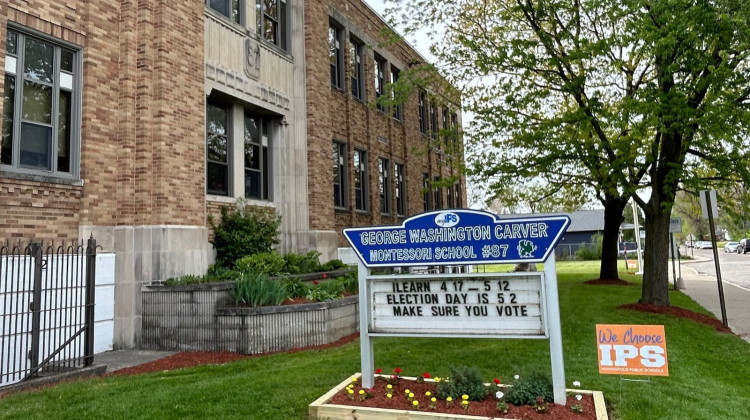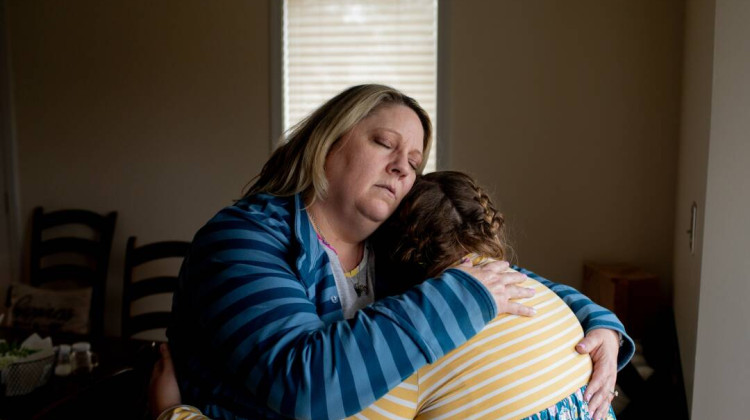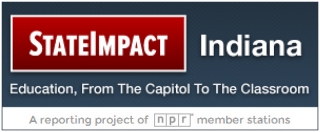"Those who can’t do, teach." It's a phrase that seems to insult teachers and downplay the importance of the profession. But after the state board of education lessened requirements to get a certain type of teaching license last month, those who leave the world of “doing” to enter the world of “teaching” is getting a closer look from the education community.
Now, a program at Indiana University is trying to make that transition a little smoother.
It’s the first day of class, and Ben Edmond’s students are moving their desks into a circle.
Edmonds is the director of the Transition to Teaching program, and over the next year will familiarize his students with teaching theories, instruct them how to make lesson plans, and give them practical experience in area classrooms.
But first, he has them share what they did before enrolling in the program.
One worked at a youth mission camp in Tennessee, another helped send a land rover to the moon, another has been working at a pharmacy as a technician trainer.
All of the students in Edmonds class have a bachelor’s degree and in most cases, practical experience in the subject they plan to teach to middle or high school students. Take for example Sarah Moore. She graduated in 2012 with a degree in biology and minors in chemistry, religious studies and sociology
"Which tells you that I really didn’t know what I wanted to do,” she says.
Moore knew she loved science, but couldn’t find the right career to use it. She thought about medical school, but ruled that out. She worked for a pharmaceutical company testing new drugs, but hated the isolation. After some soul searching and creating a few pros and cons lists, she realized teaching science was right for her.
"If I recall my 18-year-old self or my 16-year-old self correctly, I gave more attention to people I thought knew what they were talking about," Moore says. "And it was like ‘oh you’re just a teacher’ but now it’s like ‘oh you were a scientist and now you’re a teacher’ there is a little bit of a difference, so I think that that should help."
Edmonds says the practical experience Transition to Teaching completers have makes them qualified educators and attractive to employers.
"They’ve been pretty successful in their educational career and they seem ready to take on the role of a teacher," he says. "I think the second thing is the motivation that comes when you have someone that already has their degree. There just seems to be a real focus for the students that come to us and I think that makes a big difference."
The recent decision by the State Board of Education to lessen the requirements for someone like Moore to leave another profession to become a teacher was a controversial one. Opponents argued there was too much emphasis on content knowledge and not enough emphasis on effective teaching strategies.
Those involved in the Transition to Teaching program say it bridges that divide and is producing effective teachers.
Bill Jensen is Bartholomew County School Corporation’s superintendent. A lot of T2T students come here to earn their student teaching hours, and Jenkins likes to hire them after they graduate. He says their real world experience helps them connect with students.
"Well anytime you make lessons more authentic, the students are able to learn better, because they are able to connect that material with real life experiences," he says. "So anytime you do that, learning improves. The ‘why’ of learning, the meaning of learning, the relationship of application that they’ll actually do with the skills and concepts just make learning much more meaningful and lasting."
Moore is just at the beginning of her training. She says she's nervous about relating to teenagers, and finding a job, but she’s also excited to engage with others about science in a way she never could at her pharmaceutical job.
"I’m excited about sharing my love of science," she says. "I stuck with biology after knowing I didn’t want to be a doctor just because I loved it and I’m fascinated, and I want to be able to share that fascination."
On average, over the past three years, 94 percent of the Transition to Teaching graduates found jobs .
 DONATE
DONATE







 View More Articles
View More Articles

 Support WFYI. We can't do it without you.
Support WFYI. We can't do it without you.